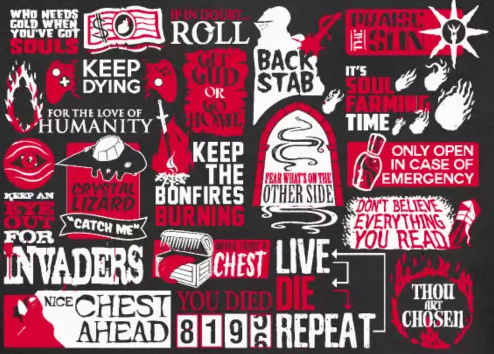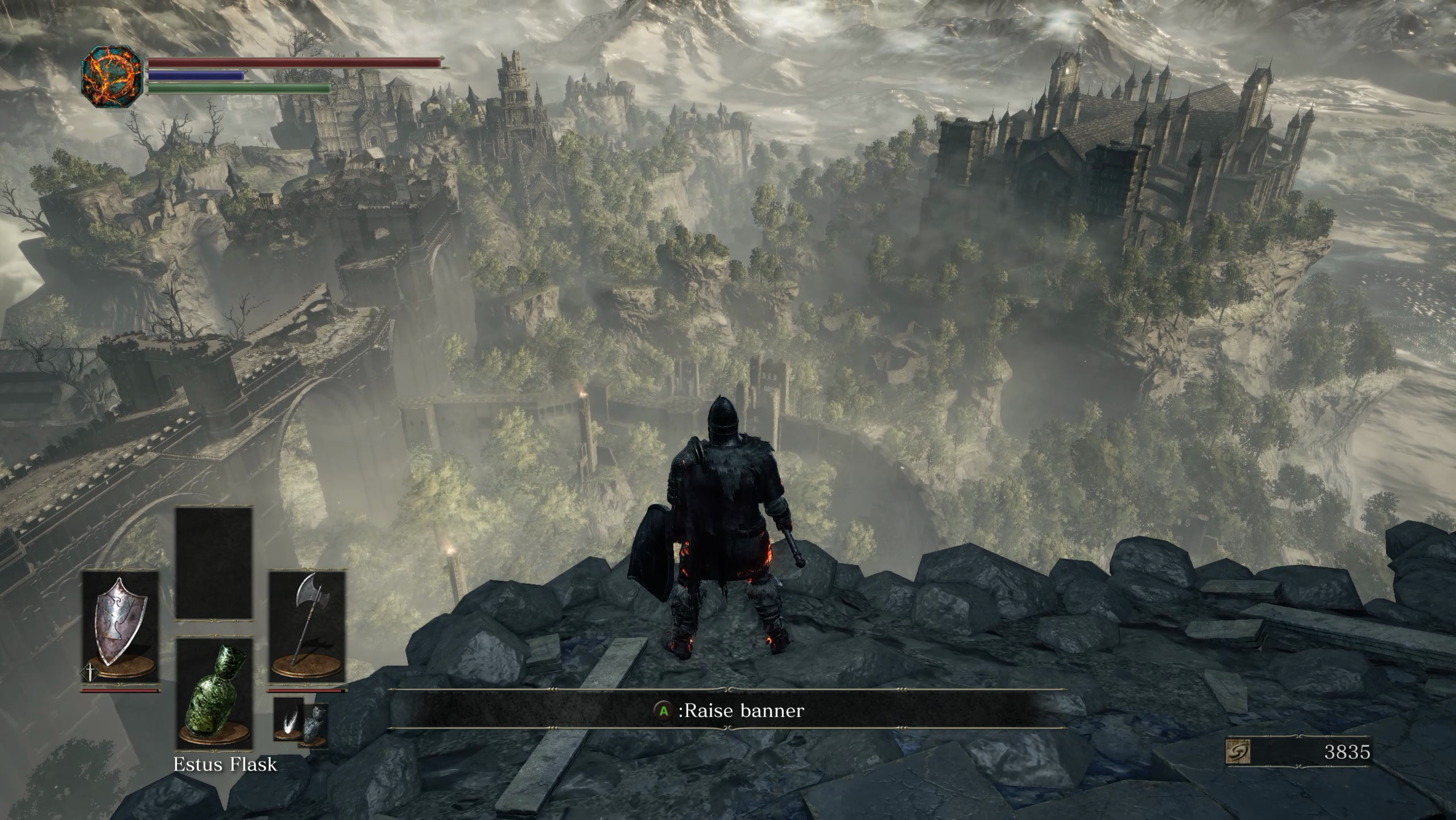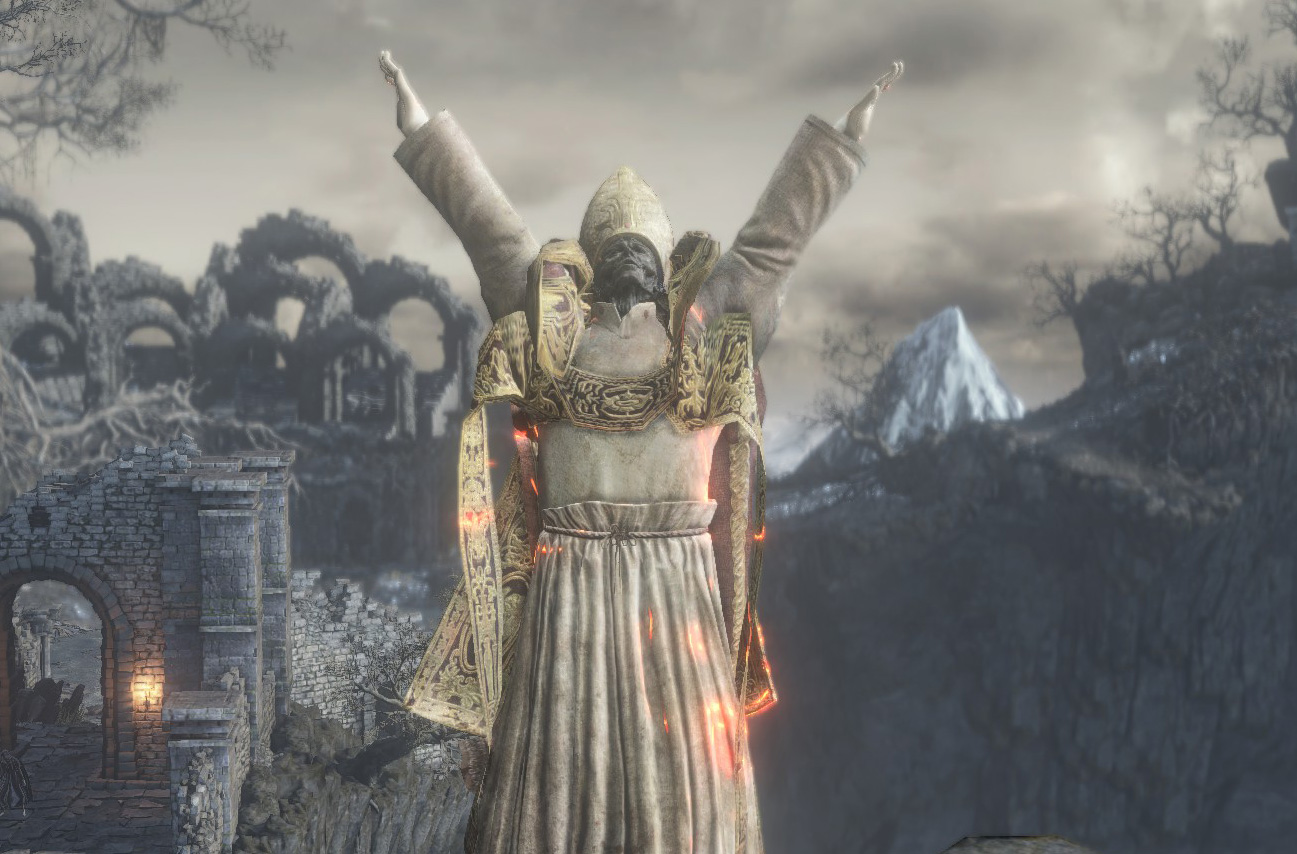We need to stop talking about how difficult Dark Souls is

More Dark Souls
Be warned, light spoilers for the Dark Souls series below.
If there’s anything we need to ‘git gud’ at, it’s treating Dark Souls as something more than a vessel for primping tough guy video game egos worldwide. The Dark Souls community isn’t hung up on the series’ notorious difficulty, even if Bandai Namco’s marketing won’t let them forget how damn hard the games are. Leading up to and following Dark Souls 3’s release, it’s likely you’ve read a comment or tweet glorifying the inclusive ‘git gud’ mentality, but none compare to the commercial directed by Eli Roth, an animated montage of torturous dark fantasy nonsense that fails to say anything other than 'this shit is dark, y’awl,' or the meme pastiche merchandise splattered with quotes and in-jokes that only serve to portray Dark Souls 3 as something of a secret club that you just wouldn’t understand, casual.
I’m not surprised to see so many players discouraged by this perspective. It’s an inclusive, reductive way to categorize the game. Yes, the games are hard, they’re cryptic, and not easy to get into, but the difficulty is just one component of what makes each Dark Souls game so cohesive and intriguing, a buttress for the feeling of embarking on a long journey. And along the way, death turns into an excuse for playful experimentation, and the unpredictable drama of online interactions set the stage for stories that no other medium can.
Get curious
I’ll never forget my first look out over Dark Souls 3’s Lothric from a perch in the high castle—the Cathedral of the Deep, cloudy Irithyll, the visible rot of the Undead Settlement. I wasn’t certain I’d see much of it. But I wound up snaking my way through it all, and at one juncture, I went down. Like, beneath-the-crust down. And at a point in that detour, I discovered a makeshift ladder and went down further still. What I found didn't just speak to the true state of the world, but spoke to the nature of it on a fundamental scale, spelling out in piles of charred, petrified demons that even chaos has a lifespan in this world.

Getting there wasn’t easy, and I’m happy for it. Because every enemy has the potential to kill you, an overriding tension piggybacks every step further into the world. With my shield up, I tip-toed through the first time, scrutinizing every nook of the environment. If I didn’t feel the need for caution and studied the environment like I did, it’s likely I would have missed out on the subtle cues that spurred me downward on my descent. I wouldn’t have noticed the sway and fragility of the rope bridge I cut to make a ladder. I wouldn’t have been able to make the connection between the Smouldering Lake and and the Ash Lake from the original Dark Souls. I wouldn’t have had any revelation about the unspoken story of this world and the centuries of history between. Difficulty is leveraged to encourage players to pay close attention, and significantly rewards that attention with story details, treasure, and the sense of a long, arduous distance traveled.
Get dramatic
But a few threats aren’t observable. PvP invasions initially turned me away from Dark Souls. I didn’t like the spontaneity of a skilled player seeking me out in an already threatening, albeit rigid world. In time, I’ve learned that the environments are a large stage on which the actors (players defined by their covenant roles) embark on improvisational journeys of trust, deceit, and surprise.
Reddit user PuppetShowJustice recalls a particularly tragic tale on the /r/darksouls3 subreddit. To summarize, he’s summoned as a Mound Maker, a purple phantom whose ambiguous role is to help or murder their host. He decides to earn the trust of his host, helping kill enemies all the way until the boss door, which Mound Makers cannot pass through. The host summons a Sun phantom to help them with the boss, who sees the Mound Maker, assumes they’re evil, and attempts to kill them. The host emotes with reckless abandon in a futile effort to get the Sun phantom’s attention, but the message is lost. To save his purple friend, the host leaps off a cliff and dies, sending both the phantoms back to their own worlds.
The biggest gaming news, reviews and hardware deals
Keep up to date with the most important stories and the best deals, as picked by the PC Gamer team.
In my experience, I’ve chased helpless hosts across the Farron Keep swamp only for blue sentinels to show up at the last second and chase me back the same way. I’ve disguised myself as a statue in a bid for surprise. (The host player had it figured out immediately, and in a playful gesture, used the same spell to turn into a statue as well. We danced and skittered around as statues for a good five minutes before I bowed and returned to my world.) I’ve helped first time players finish some of the hardest bosses time and time again, not because I get a few minor covenant rewards, but because I know they might be frustrated. Dark Souls’ covenants don’t give you a rigid online role to inhabit, and like the solo journey, they encourage playing around with the potential within each. The result is a spontaneous, unpredictable cluster of human drama with a lighthearted edge—everyone wants to find their fun.
Get playful
Good thing it’s so easy to find fun in a dark fantasy toy box. When death in Dark Souls strips me of small achievements, like progress through the environment and collected souls, I have nothing left to lose. I’m free from dread and consequence, I know what’s ahead, and I’m ready to throw myself at it. The fulcrum for challenge shifts from evading death to embracing it. Death is an opportunity to find chinks in the armor of a boss, a better strategy for taking on a group of enemies, or to test out new armor set with different resistances. The fulcrum becomes how much I’m willing to experiment and play with the tools provided, and there are plenty: dozens of armor sets and weapons, over 100 rings with accompanying buffs and debuffs, spells, pyromancy, summons, and more.
With enough nihilistic creativity, there’s always a way through.
What felt impossible and overbearing a few minutes ago might remain a challenge, but now I treat it like a playground for experimentation. With enough nihilistic creativity, there’s always a way through.
Dark Souls’ difficulty is not about being a ‘real gamer’ or ‘gitting gud.’ It’s the foundation for a variety of unique experiences that require a bit of strain and experimentation to reach. And while a series of perfectly timed dodge rolls or sword swipes can be immensely satisfying, the bulk of the Dark Souls community’s fascination doesn’t begin and end there. The Dark Souls community cares about manners. Should we expect to begin every invasion duel with a friendly bow? They care about deciphering the lore. Who the hell is Pontiff Sulyvahn and why is he such a mean pope? They care about rolling into every wall and jumping off every ledge until there’s nothing left to know about Dark Souls (god forbid). It’s the fervent desire to know something completely—its physical space, abstract rules, social (dis)courtesies, and deep lore—that should be the brightest signal light for wary players.

James is stuck in an endless loop, playing the Dark Souls games on repeat until Elden Ring and Silksong set him free. He's a truffle pig for indie horror and weird FPS games too, seeking out games that actively hurt to play. Otherwise he's wandering Austin, identifying mushrooms and doodling grackles.


